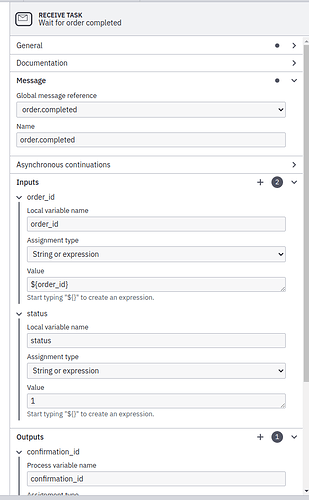We’ve created an event driven microservice based application. Everything that happens generates an event, that can be picked up by other microservices, or by camunda. I think this is the exact use case where camunda is focusing on (orchestration for microservice based applications).
Current setup in Camunda 7
We currently use Camunda 7, and have created a Java plugin to integrate camunda with our AMQP message bus (RabbitMQ). We can publish an AMQP message (for example “order.updated”) to any running processes that might be waiting on an order confirmation. As the message name, we use the amqp topic, and with input mappings, we can specify filters for what events we want to handle.
An example of a event can be like this:
{
"orderId": 123,
"status": 1,
"confirmation_id": "ABCDEF123456",
"validated_by": "some_user"
}
When we receive an AMQP message, our plugin will loop over all message subscriptions, and match them with the amqp message (so we do our message correlation ourself). This way, we can have a BPMN process that will initiate an order, and since an order might take a while to be completed, we wait for the order.completed event, and filter based on orderId = 123 and status = 1 (from the input mappings, see below).
Now, Camunda Platform 8
In Camunda Platform 8, this will have to change. We like the approach to be able to just subscribe on a topic from a Receive Task, and filter based on some variables, but this won’t work anymore, since a message can’t have input variables, only a correlation key.
Also, we can only use the PublishMessage RPC, so we can’t do the message correlation ourselves anymore, and by design, Camunda Platform 8 will correlate a message only to one process, as explained here: Messages | Camunda Platform 8
The only solution I see is for our system to generate specific events, with a correlationKey, like order-updated-123-1, but then we aren’t using the event driven way anymore and created a lot of overhead.
Is there a way to do this in Camunda Platform 8?
Maybe a solution
A solution could be to add input filtering in addition to the correlationKey, and allow a message to be handled by multiple receive tasks in multiple processes (but Message Cardinality is by design, so this won’t change probably). Some related discussions here: Multiple identical Message Events are not honoured with Publish Message · Issue #4644 · camunda/zeebe · GitHub
This way, we can publish the above message, and add input mappings for orderId and status, and allows us to extract the confirmation_id with an output mapping.

